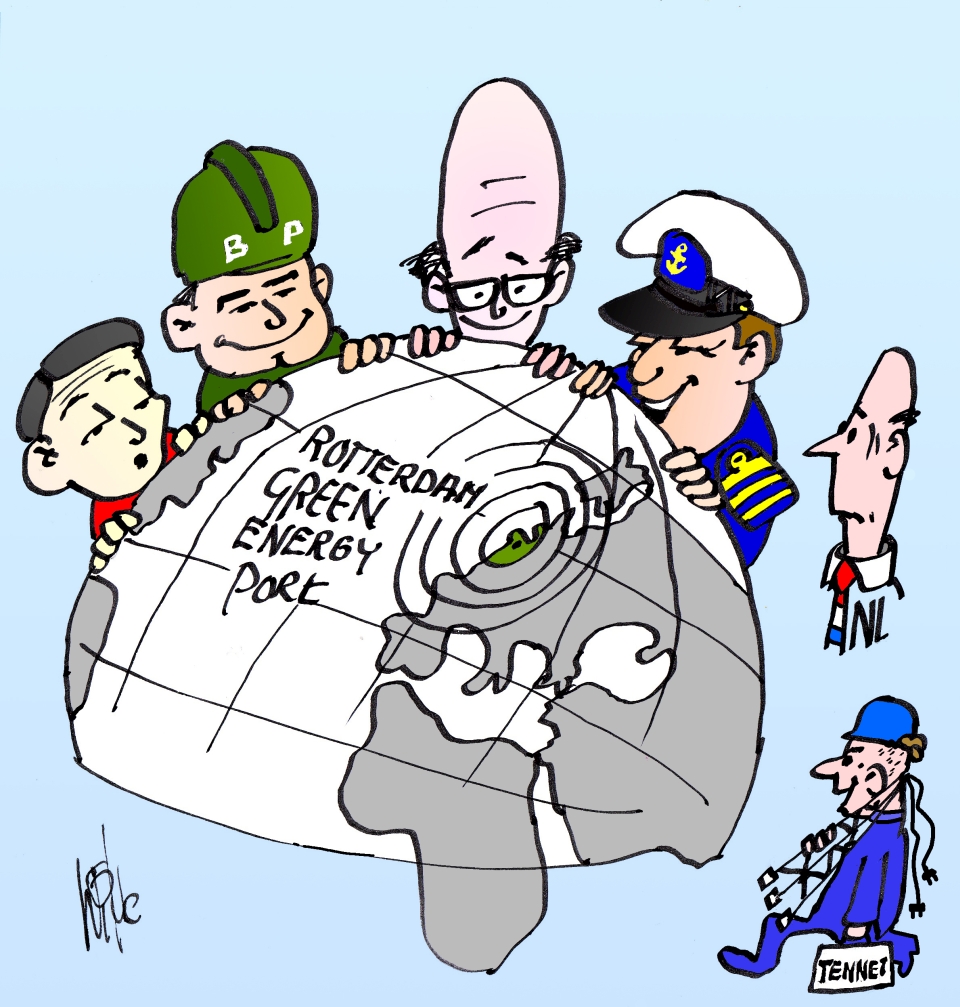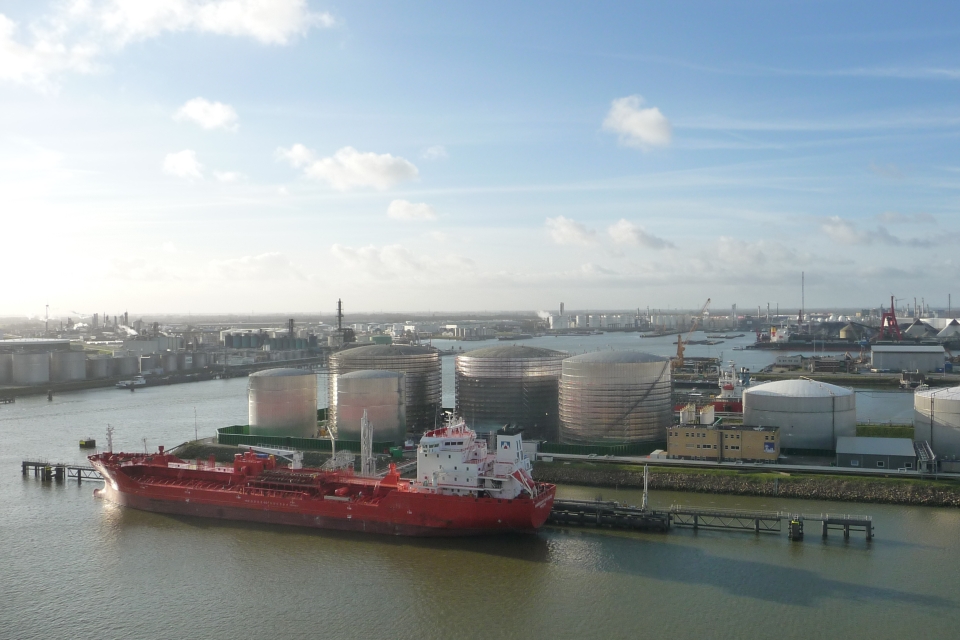In late April, the Port of Rotterdam spread hopeful news of its efforts to make shipping fossil-free. Europe’s largest port is ready for bunkering ships with alternative fuels like methanol, and next year, ships may be able to bunker ammonia in Rotterdam. But the decarbonisation of Europe’s largest industrial port complex is going considerably less well than hoped, and there is a risk of major industrial companies leaving for abroad. With that, the Port of Rotterdam could also lose a significant part of its transshipment as well as an important foundation of its economic future.
In every issue of SWZ|Maritime, SWZ|Maritime’s editor-in-chief Antoon Oosting writes an opinion piece under the heading “Markets” about the maritime industry or a particular sector within it. In the May 2023 issue, he discusses how decarbonising the Port of Rotterdam may be a challenging issue.
The latter was to be heard at the 41st edition of the Port of Rotterdam Congress (Havencongres), organised by Vlaardingen-based Management Producties on April 18. Representatives of oil mayor BP, which has its biggest European refinery in the Port of Rotterdam, and the Norwegian fertiliser manufacturer Yara, with a large site in the port area of Terneuzen, warn that to invest in making their companies fossil-free, they are dependent on the investment decisions of their parent companies.
When it comes to deciding where and where not to invest in the future, these companies may well prefer countries, particularly the United States, where they are treated in a much friendlier manner than in the industrially hostile political climate currently prevailing in and around The Hague’s Binnenhof.
Also read: Plenty on the table, but inland navigation is in motion
Fossil still important
Although the Port of Rotterdam is visited more and more often by ships that use cleaner fuels, which emit less carbon dioxide (CO2), the fact is that 55 per cent of the flow of goods is still of fossil origin, like crude oil, mineral oil products and coal. And while the handling of containers fell back (-10,8 per cent), the import (and to a lesser extent export) of coal, oil, mineral oil products and especially LNG grew to 55 per cent of the total throughput in the first quarter of this year.
The handling of containers in tonnage represents only 28 per cent of the total flow of goods in metric tonnes. This means that the Port of Rotterdam is still hugely dependent on the import and export of fossil commodities. These fossil commodities of coals and oil are transferred in fuel (coal and LNG) for electricity, the heating of our houses, fuels for our transport and not to forget, the huge petro-chemical industry in the Port of Rotterdam.
As the industry is mainly based in port areas removed from the inhabited world, such as Botlek, Europoort and Maasvlakte, a great deal of the people and the politicians seem to have no idea how important this industry is for the economy and earning capacity of “BV Nederland” (Netherlands Ltd.), which is also an important source of our tax revenue that we use to keep our expensive social welfare system afloat.
To keep the industry up to date, especially now that pressure is mounting to break away from fossil fuels as quickly as possible, it is necessary to continuously invest extra money. But that only happens when there is some prospect of positive return on investment in the future. And that has become quite uncertain in the current Dutch political climate.

A great risk
This means a great risk for Rotterdam and the Netherlands, as without its industry, the port reverts to a conduit for containers. Thanks to extensive automation and digitisation in the near future, they will enter and leave the country as quickly as possible, towards the European hinterland.
With the continued automation of container terminals and autonomously sailing inland vessels that may in the future be operated from land, there will be little employment left in the Rotterdam port and industry. The loss of industry is a great risk to our economy and our society. As a result, the Netherlands will deteriorate further into a service economy with a few well-paid managers and many low-paid jobs.
The loss of industry also has a major effect on knowledge development and innovation, warns Ester Barendregt, chief economist/head of the Netherlands, Economics and Sustainability at RaboResearch.
At the Havencongres, Victor van der Chijs, chairman of Deltalinqs, the interest organisation that represents over 95 per cent (700 companies) of all logistics, port and industrial enterprises in the mainport Rotterdam, assures once again that the businesses in the port area are sincerely involved in the energy transition, but a serious problem is that they lack the public’s trust. He points at recent research showing that consumers distrust the good intentions of the business community.
In his presentation, he emphasises that so far, there are 25 projects of firms and industries operational that decarbonise their energy or raw material supply. Fifteen projects are in progress and another fifty are in preparation.
Also read: Northern Dutch shipyards compete for major fleet replacement
A lot of obstacles
Yet, becoming fossil-free is far from easy for companies. Businesses face a lot of obstacles in trying to decarbonise their operations. In a survey by Deltalinqs, no less than 67 per cent of the companies surveyed indicate that they are experiencing problems with the delayed construction of the required sustainable energy infrastructure. Those who want to switch their energy supply from gas to electricity simply cannot get it, because the energy suppliers cannot deliver. 59 per cent of the companies do not know whether they can count on the necessary permits. Another 48 per cent is dependent on a final investment decision of an international parent company.
Most industrial companies in the port of Rotterdam have international owners in for example London, New York, Minneapolis or Hong Kong, which weigh investment decisions in projects against conditions and prospects for profit in Europe versus the United States or Asia. At that point, Europe now often draws the short straw as an investment in the US currently offers more benefits. The US dangles a carrot of high subsidies and investment support in front of companies while Europe has a policy of carrot (subsidy) and stick (sanctions). Unlike in the US, companies in Europe that cannot meet stricter environmental requirements are penalised with high fines.
Also read: ‘Maritime sector is good for our economy and jobs’
Huge investments
Also, the higher taxes that the Rutte IV Cabinet imposes on businesses don’t help in the decision where international companies will invest. The projects are there. Karen de Lathouder, CEO of BP Netherlands, wants the BP refinery in the Port of Rotterdam to be zero-emission. Together with a bio-refinery and a hydrogen factory, this requires an investment of more than 10 billion euros. Even for a big multinational, this is no small amount.
According to Michael Schlaug, director of the Terneuzen site of Yara, the Netherlands is a very difficult country to invest in. Yara produces ammonia, which is a very attractive alternative fuel for shipping as it contains much more energy than hydrogen and can be produced fossil-free. Yara wants to produce the ammonia with the help of green wind energy, but again, this requires a huge investment.
Yet, in the vision of Port of Rotterdam CEO Allard Castelein there is no time for pessimism. The Port of Rotterdam fully supports the UN’s sustainability goals and the EU’s climate goals. The seventy projects (shipping and industry) that the port authority has initiated should ensure that CO2 emissions are reduced by 55 per cent by 2030 and that the goal of 100 per cent CO2 emission reduction by 2050 is achievable.
‘With the best port infrastructure in the world, no industrial complex can be found that is as well equipped to enter the energy transition as the Port of Rotterdam,’ is Castelein’s firm conviction. ‘There are plenty of plans. The ambition is there. The only thing we are waiting for is the permits.’
According to Castelein, the port-industrial complex in Rotterdam is even capable of removing 29 million tonnes of CO2 from the air each year. This would enable Rotterdam to far exceed the forty per cent emission reduction target imposed by the national government. But to do so, agencies such as national grid operator Tennet would have to cooperate with timely expansion of the electricity grid in the Port of Rotterdam.
Also read: Renewed prospects for ship repair after years of slump
Moral also needs power
Therefore, policies must be changed and it needs to be recognised that moral interests in this worlds also need strategic thinking to develop power, the theme of the concluding speech of the Havencongres of Arend Jan Boekestijn, under the title “Pastor desperately needs the merchant”. Boekestijn is a Dutch historian, former Member of Parliament and speaker for geopolitical strategy, economy, and energy transition.
He predicts a fine future for the Port of Rotterdam if it succeeds in fulfilling its plans to develop into a hub for alternative fuels, especially hydrogen. Rotterdam as a hydrogen hub can make Europe stronger in the battle against the US and China. At this moment, fourteen per cent of all energy in Europe comes in through Rotterdam.
Today, this is still fossil: oil, natural gas and coal. But when the port succeeds in building up strong positions in all alternative fuels, it could also become Europe’s green energy port. ‘Green hydrogen, made with wind and solar power, is the holy grail in the energy transition,’ Boekestijn says. He points out that until now, hydrogen is mainly used to produce fertiliser, but it can also be used for high-temperature processes such as steel. Replacing natural gas with green hydrogen, would reduce CO2 emissions.
Picture (top): The Botlek area in the Port of Rotterdam (by BoH, Wikimedia Commons).
Also read: Optimism about decarbonisation under threat of a China-US war








